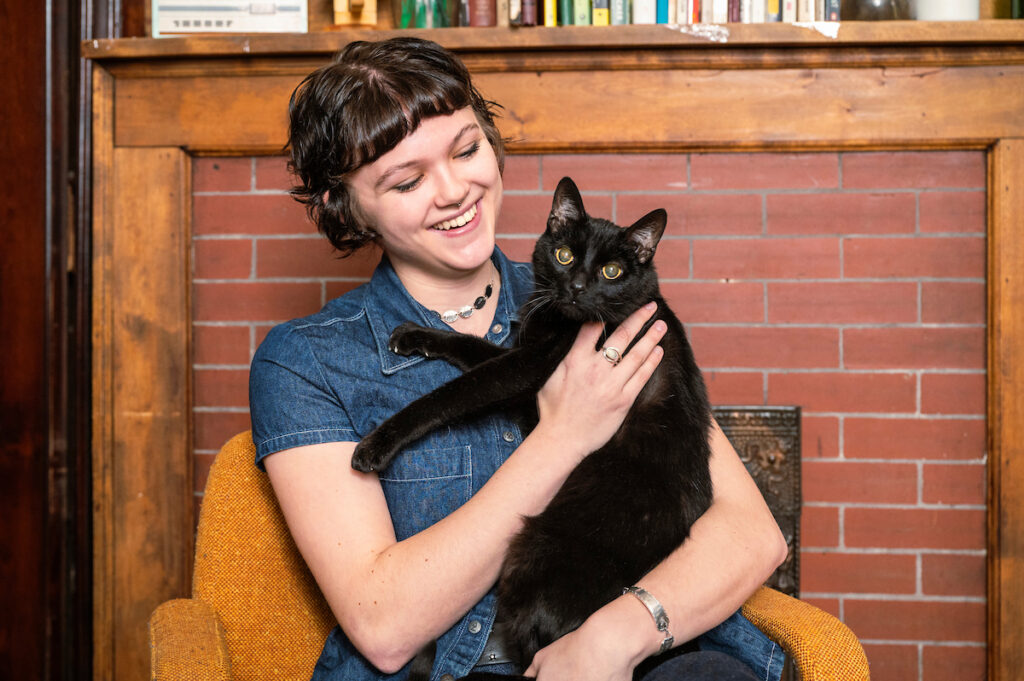
How One Student and Her Cat Navigated Madison’s Tough Rental Market
Students with pets have struggle to find a place that will accept their furry friend.
By: Xintong Shi
A chilly morning breeze pierces through downtown Madison. Amber Zhu tightens her jacket and hugs the small pet cage in her arms tighter. Inside the cage, her orange cat Milo, let out an uneasy purr. Amber had just signed a lease on a new apartment. It was one of the rare apartments that allowed pets, near Regent Street. Today was more than just a move. It’s the first step in making Madison truly her home.
Every year, thousands of University of Wisconsin-Madison students have to frantically scramble to find housing for the coming year before their leases end. But for tenants like Amber who own pets, finding housing is much more difficult. High rents, limited options and strict pet policies provide compounding challenges . This makes finding a safe and friendly place to live a huge challenge both emotionally and practically.Amber’s experience epitomizes this dilemma.
“I searched for almost a month before I found a place near Regent where I could keep my cat.” Amber said.
For Emily, the search wasn’t just about having a place to sleep. It was about finding a space where both she and Milo would be accepted. Strict pet policies have drastically narrowed her options. Many apartments either ban pets or charge hefty nonrefundable deposits and monthly pet rent. In Madison’s already strained rental market, these additional hurdles added to her stress. Amber’s experience is representative of how pet-owning tenants often have to spend more time, energy and money in a competitive rental environment.
Even when they come across a desired property, the mere mention of having a pet often results in an on-the-spot price increase.
“One time I particularly liked a house that was priced right and in a good location. But as soon as I mentioned I had cats, they just raised the price by $150.” Amber recalls.
Amber’s is not alone in her experiences. In an oversupplied rental market like Madison’s, where landlords have little incentive to cater to the needs of “complex” tenants, Amber’s story reflects a broader reality. While universities encourage students to learn independent living skills, the rental system often doesn’t support the diverse realities of students, especially those who choose to have pets. Renters are repeatedly turned away simply for bringing their beloved pets. This emotional frustration lingers long after the rental is over.
Even after signing up for a house that “allows pets,” the reality is far less forgiving.
“Even though it said it was pet-friendly, there was an additional deposit. And Milo was never allowed to leave the apartment.” Amber says.
Many apartments that ostensibly allow pets are actually riddled with restrictions.The strict rules make it necessary for her to be constantly attached to Milo, who must be kept inside at all times, and any noise or damage could trigger a fine or even eviction from the apartment. For a tenant who works part-time while attending classes, these extra burdens add to an already stressful life. Amber’s experience reminds us that renting an apartment is only the first step, and the subsequent adjustment can be just as difficult.
However, Amber is adamant that it was all worth it.
“Milo has given me a lot of emotional support,” she said.
Milo has been her greatest comfort during late nights studying for finals and lonely times away from home. For many tenants, pets are an important pillar which contributes to mental health. Emotional support is inextricably linked to a sense of belonging to a space, pets are indispensable companions in this journey.
Looking back on her own rental experience, Amber also has a word of caution for students planning to bring their pets to school.
“Make sure you prepare early and don’t just find a place to make do because you’re anxious.” She said,
Amber’s search is more than just a search for an apartment. It was a story of perseverance, uncertainty, and the emotional stress of finding a safe space for herself and her cat Milo. After a chilly morning, countless anxious searches, and a long, agitated night of waiting, they finally found a place near Regent Street. They finally found their own corner near Regent Street.
It’s stories like Amber’s that inspire OpenHouse to create a friendlier, more transparent rental experience. By providing authentic rental information, support for pet-friendly screening, and tenant review features, OpenHouse helps students navigate Madison’s complex housing market with more confidence and less anxiety. It’s more than just a tool for students who feel neglected or exhausted during their apartment search, it’s like a start to home.
Sources:
Amber Zhu, undergraduate student in University of Wisconsin, Madison , (382)4501251
Blog: Where is the truly “pet-friendly” housing? (n.d.). HumanePro. https://humanepro.org/blog/blog-where-truly-pet-friendly-housing
City of Madison. (2024, June 24). Admissions and continued occupancy policy: Chapter 10 – Pet policy. City of Madison Department of Planning & Community & Economic Development. https://www.cityofmadison.com/dpced/housing/documents/ACOP%20Ch10%2006-24-2024.pdf
Tenant Resource Center. (n.d.). Get help. https://www.tenantresourcecenter.org/get_help
Steadily. (2023, May 5). Pet laws and regulations for rental properties in Wisconsin. https://www.steadily.com/blog/pet-laws-regulations-rental-properties-wisconsin

